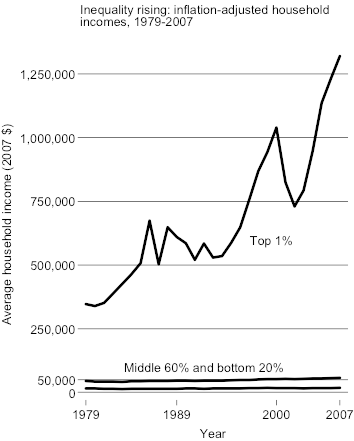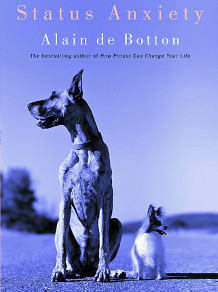The Cost of (Unequal) Wealth
The facts are in regarding economic inequality. It exists!
- In America, the top 1% own 33% of the wealth in America, the next 9% own another third, and the bottom 90% of Americans own the final 33% of wealth. (The bottom 50% possess just 3% of the national wealth.)
- Corporate executives, on average, earn 200x more than the average worker.
- In India, the tremendous economic gains since 2000 have only been enjoyed by 20% of the population. The bottom 80% has not got any richer.
- Globally, the richest 83 people in the world own as much as half of the population (3.5 billion people).
Despite its promises, recent globalization and financial deregulation has disproportionately benefited the rich. The rising tide only lifted the big boats. While the causes for national and global inequality are complex and hotly debated, the realities of inequalities are apparent and staggering.
What are the results of significant wealth gaps?
According to British social researcher Richard Wilksinson, economic inequality is socially corrosive. In a TED talk “How Economic Inequality Harms Societies” Wilkinson presents data demonstrating that social health is linked to economic equality, not GDP. The collective wealth of a country does not ensure a healthy society (i.e., low rates of murder, infant mortality, incarceration, mental health, etc.), so much as the equal distribution of that wealth. The relationship between economic equality and social well-being is true when comparing developed countries in the world, and the 50 states in America.
So if “Economic inequality –> Social Deterioration”, what is the “–>”?
Why does one lead to the other? Towards the end of the TED talk, Wilkinson hints, “I think I’m looking and talking about the psychosocial effects of inequality. More to do with feelings of superiority and inferiority, of being valued and devalued, respected and disrespected. And of course, those feelings of status competition that comes out of that drives the consumerism in our society. It also leads to status insecurity. We worry more about how we’re judged and seen by others, whether we’re regarded as attractive, clever, all that kind of thing.” 
Relative (not absolute) poverty creates a sense of ‘status anxiety’. We begin to fear society will compare us to other people – the ‘haves’. If the Jones have more, that makes us appear socially inferior, and we begin to internalize that inferiority as shame. Economic inequality produces shame, and shame leads to various forms of social dysfunction as people strive to create status falsely. Shame breeds sin.
The PBS news video ‘Pernicious’ Effects of Economic Inequality shows the flipside – wealthy people attribute a higher status to themselves. A person in a luxury car is 3-4 times less likely to stop for a pedestrian. Or someone winning a game of Monopoly, even when it is obviously rigged in their favor, communicates feelings of superiority and respectability.
Wealth induces a false sense of honor and importance, just as (relative) poverty creates a sense of shame. Money, when balanced improperly, leads to false honor and false shame.
Do you see the shame of poverty play out? What are its dynamics?

Could you provide some sources for your opening stats?
I’m not doubting them, just wanting to dig deeper and reference original research as I pursue the implications of this.
Thanks!
Robby, thanks for asking. I try to include citations in the form of hyperlinks as much the blog genre allows, but in this case did not do that.
I am no expert in economics, but enjoy reading in areas of social economics (esp when it touches on honor-shame!). Research on economic inequality has exploded in the last 5-10 years, so many of these statistics are often cited as common knowledge at this point.
To learn more about the nature of economic inequality, I have benefited greatly from Joseph Stiglitz and Robert Reich (just search their works on Amazon), as well as NYTimes articles (just search ‘economic inequality’ there). Stiglitz had a series The Great Divine at NYT as well – http://opinionator.blogs.nytimes.com/author/joseph-e-stiglitz/
As for quick stats, just google ‘inequality’ or ‘economic inequality.’ As for the 4 stats that I cite, the first, second, and fourth are all so commonly referenced I am not sure who said them originally, but that does mean it is easy to find credible (Forbes, NYTimes, etc.) sources for all them.
Fact 1- See point 5 at http://www.pewresearch.org/fact-tank/2014/01/07/5-facts-about-economic-inequality/
Fact 2 about executive compensation, Stiglitz says it is 295x higher than average pay in a post at The Great Divide, so 200x is sadly conservative.
Fact 3- I remember the third fact about India from reading Stiglitz’s Making Globalization Work years ago, so cannot recall the specific page number.
Fact 4- Just google “top 85 richest people” and there will me multiple references for this fact. You’d probably have to do quite a bit of digging to see who said it first.
Hopefully that helps you dig deeper. The second half of the post has some links that may be helpful as well.
-Jayson
My experience is that the shame associated with poverty does not change as economic wealth increases. The shame and its related dysfunction seems to continue and even inhibits the person’s ability to manage their family’s economic growth.
I have been thinking much lately about the difference between seed and bread. I find that most in poverty are very familiar with what to do with bread, but struggle with how to deal with seed. They often ask for bread when what they need is seed, and when someone gives them seed, they eat it instead of planting it, then are left hungry and with no wheat for flour to make bread in the future. It is very exciting to see Jesus deliver people from shame and empower them to receive seed and plant it for future harvest.
What are some of the best practices in helping impoverished people, especially in honor shame cultures, learn seed principles? For that matter, how do people from other cultures also grow in these principles?